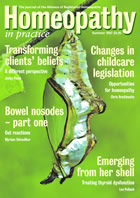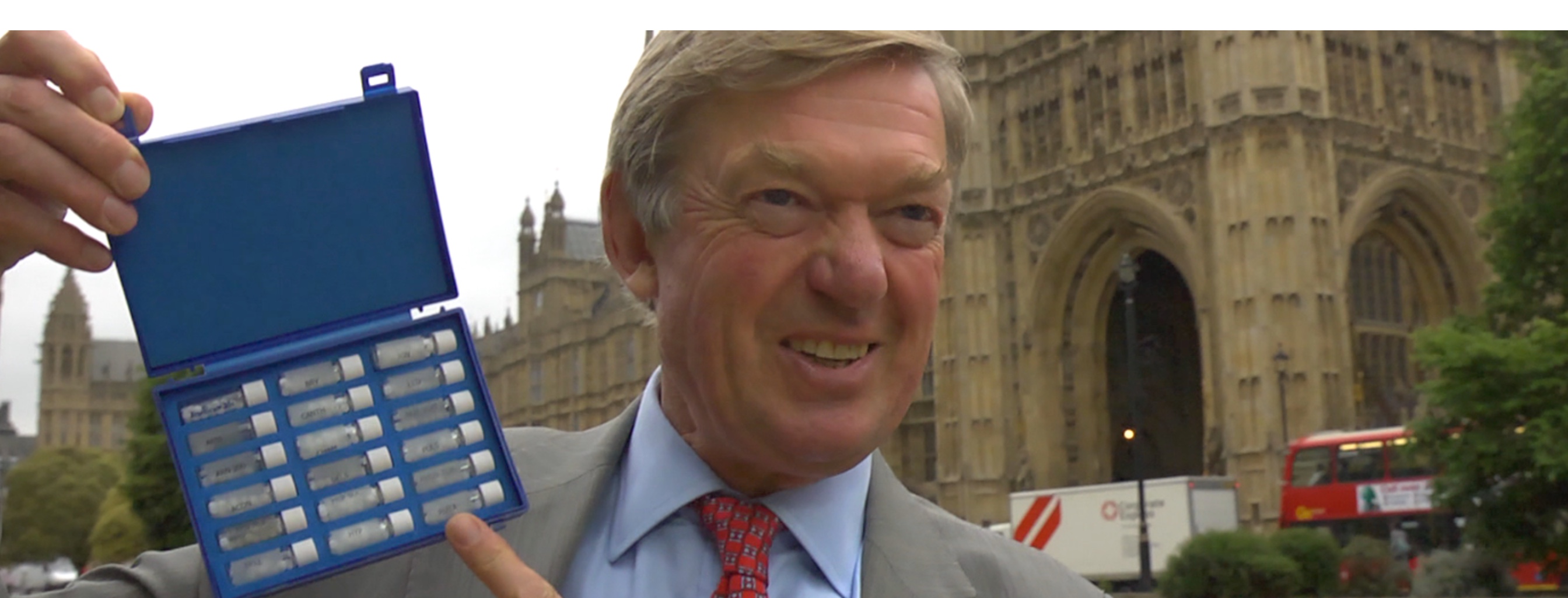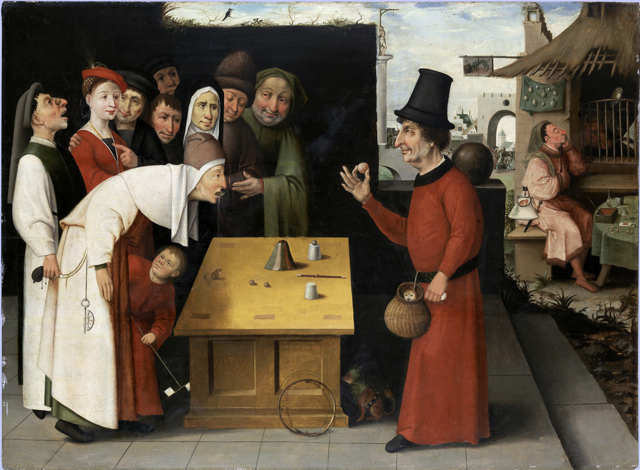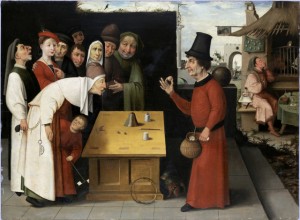Begging the Question for Homeopathy
 As my own personal tribute to Homeopathy Awareness Week, and as promised in my last post, I would like to critique a paper that has appeared in this Summer’s edition of the journal, Homeopathy in Practice.
As my own personal tribute to Homeopathy Awareness Week, and as promised in my last post, I would like to critique a paper that has appeared in this Summer’s edition of the journal, Homeopathy in Practice.
The article is entitled “Hormesis, epitaxy, the structure of liquid water, and the science of homeopathy” and is by Domenico Mastrangelo. The paper has appeared elsewhere but is obviously so important that HiP sees fit to republish it. You can view the text here.
Mastrangelo’s thesis is that homeopathy is a real science based on sound scientific principles and should not be derided as ‘unscientific’ and ‘implausible’ by the ‘western medical establishment’. Now if Mastrangelo can really do this, then it would indeed be a major scientific breakthrough of unprecedented scale. The reason the ‘establishment’ has a problem with homeopathy is that it beliefs are in direct contradiction to most of chemistry, physics and biology. The abstract closes with the hope that
this hurdle will be overcome by opening academic institutions to homeopathy to enlarge the horizons of medical practice, recover the value of the human relationship with the patient, and through all this, offer the sick a real alternative and the concrete perspective of an improved quality of life.
Has Mastrangelo made the break through? Let’s look at each section in turn.
What is Science?
Mastrangelo begins by reviewing what science is. And tells us the following,
The “scientific” method encompasses the following phases:
1. Observing and describing a phenomenon or group of phenomena.
2. Formulating a hypothesis to explain the phenomena.
3. Using the hypothesis to predict the existence of other phenomena, or to predict quantitatively the results of new observations.
4. Performing experimental tests of the predictions by several independent and properly conducted experiments
Now of course a full philosophy of science would take up much space more than this, but Mastrangelo quickly dismissed these points by saying that ‘archaeology, psychology and geology’ could not be considered sciences under this definition. Domenico does not say why or give references. It must come as a bit of a shock to people working in these professions. Are they not capable of doing experiments to collect data, forming hypotheses, testing the predictions of the hypotheses against observations?
This sort of distortion of science is seen in creationism where we are told that evolution cannot be a science because you cannot observe evolution in a laboratory. This is a very narrow view of what an experiment is. Geologists, and so on, are quite capable of the systematic and controlled collection of data (an experiment) although this may take place in the field rather than the lab.
Fortunately, Mastrangelo invites the geologists and psychologists back in by offering his own definition of science,
the field of study which attempts to describe and understand the nature of the universe in whole or part.
Now, this definition will definitely include geology and so on, and it will also include homeopathy within its fold. Homeopathists do say they are trying to understand ‘healing’ – that is a part of the universe worth understanding. However, under this definition we can just about let in anything that attempts to describe the universe and the we have to call it a science: creationism, Scientology, Greek mythology, literature, pastafarianism, voodoo, astrology, mithrasism, Christianity and just about any alternative medicine.
So, by adopting a ridiculously weak definition of science, Mastrangelo is begging the question. His premises for the paper make it inevitable that he will succeed in poving that homeopathy is a ‘science’, but only under his owen terms. What is of course missing from his definition is all the rigour that allows us to exclude astrology and reiki from science: observation, evidence, hypothesis, experiment.
Not a good start to the paper.
Homeopathy as a Medical Science
Next, the task is to show how Hahnemann founded homeopathy on firm scientific principles. We are treated to a biography of the founder of the practice and a history of the discovery. The argument of the paper is that because Hahnemann formed hypotheses (like cures like) and performed drug testing-like experimental practices (provings) that homeopathy is ‘scientific’. Mastrangelo appears to be slipping around on his own definition of science here.
Hahnemann’s way of proceeding through hypothesis, observations, testing, validation, and formulation of principles leaves no room for doubt: he was using the “scientific method” to explore an entirely new medical and biological world…
However, this only works if one takes, again, a rather limited view of what science is.
If we were to take this at face value then we could also argue that phlogiston, the bodily humours and the ether are all scientific. All were part of scientific hypothesis at some point in the past and experiments were performed to detect these phenomena. But advances in observation and theory all show that these things are not real. To continue to say that fire is caused by phlogiston is not scientific, even though it might once have been. In the same way, to say that just because Hahnemann’s techniques once appeared to be scientific does not mean that they are now. If you keep calling them scientific, and ignore subsequent findings, you are practicing bad science or even pseudoscience.
One needs to be careful with the word ‘proving’ when homeopathists use it. Their use does not have the same everyday use. A proving is the process by which homeopathists discover which substances create similar symptoms in suffers to those caused by illness. In this sense, Provings are only proving anything if the principle of like-cures-like holds. This is one of homeopathy’s central weaknesses and Mastrangelo returns to this point.
In retrospect, it is easy to see where Hahnemann went wrong. At the time, most doctors may well have been doing more harm than good with their blood letting and quack remedies. Hahnemann was no different in administering poisons in the hope that like cures like. Hahnemann noticed that the more dilute the poison, the better his patients appeared to do (not surprising really). If he diluted his poisons into pure water then his patients did best of all because at least no harm was being done and perhaps a placebo response was being gained. What homeopathy is is a therapeutic placebo and this has been demonstrated many times in experiment. To cling to ideas of ‘like cures like’ and ‘dilutions and succussions’ is unscientific in the same way that clinging to ideas of alchemy is unscientific. Hahnemann mistook minimal intervention, a placebo response and allowing disease to take its course for a genuine therapeutic effect. Homepathists have been making the same mistake for over 200 years.
Hormesis
The next part of the paper tries to convince us that ‘like-cures-like’ has a sound scientific basis. It introduces the concept of hormesis; the idea that favorable biological responses can be gained from low exposures to toxins. Mastrangelo presents this as something that western science has a problem with and avoids using the term. At one level, the concept is trivial and accepted by all. Paracetamol is a rather deadly toxin that can destroy the liver. In small doses it acts as a analgesic and the body can readily deal with processing it so that it does not become a danger.
However, Mastrangelo wants us to take a strict view of hormesis where in low doses substances have the opposite effect of that at high doses. In this world, paracetamol would not be a cure for headaches but for liver disease – like cures like. Substances may well have different physiological effect at different doses, but there is no mechanism that supposes they have the direct opposite effect and so support the like cures like hypothesis. Vitamins can have greatly beneficial effects a low doses, but can become highly toxic at high doses. The biological mechanisms for benefit and harm need not be the same and indeed most often are not.
There are several things wrong with taking the hormesis view of homeopathy. Firstly, it presupposes that the poison is the cause of the illness. Low doses somehow stimulate the body to respond better to high doses. Real biological mechanisms may well exist for some types of hormesis. Radiation has been studied with some interesting, if not controversial, ideas that somehow the immune system may become ‘hardened’ after exposes to low levels of gamma rays and so better cope with higher levels. However, for illnesses that are not caused by toxins (most) hormesis can play no part whatsoever. (It is worth noting that many homeopathists deny the discoveries of medicine that illnesses can have viral, bacterial, parasitical and genetic origin.)
Secondly, all this talk of hormesis can only really have any value if a low dose is actually administered to the ill person. But with homeopathy, all but the very ‘weakest’ doses have been diluted to the point where no dose is present and so no hormesis can take place. Mastrangelo notes this and tells us that his theories are applying to doses ‘below Avogadros number’ I think he is confused in his terminology here and I believe he is saying that most homeopathic preparations are not diluted beyond the Avogadro limit.
The Structure and Behaviour of Water
Next, rather confusingly, and despite saying in the previous section that homeopathy can be explained in terms of low doses and hormesis, Mastrangelo goes on to discuss the idea that somehow water contains a ‘memory’ of the active ingredient once it has been diluted beyond the Avogadro limit. So now, homeopathy needs two mechanisms – one for when the poison is present in the dose and one for when it is not.
The idea that water can maintain the physical properties of water through adopting some sort of semi permanent crystalline structure is very old. And the lack of any evidence for this hypothesis is very old too. The arguments in favour of structured water appear to rest on analogies and special pleading. Mastrangelo is no different here.
First, Mastrangelo creates a straw man where he paints scientists as ignorant of the special nature of water and how it can have unusual structural properties and be very important in many biological structural mechanisms in proteins and DNA. Of course, science is not ignorant of these fascinating properties as it was scientists who discovered them in the first place and they are now part of mainstream science. Of course, water is a vital ingredient of biological processes and of course water has interesting structural properties.
Mastrangelo then creates false analogies by saying that carbon can have different properties depending on its structure; diamond, graphite etc. Of course! What has this got to do with homeopathy? Then, epitaxy is introduced where crystals are grown on substrates and the crystal takes on structural properties of the substrate. All standard stuff. Semiconductor electronics depends on this phenomenon. However, Mastrangelo makes the extraordinary claim that epitaxial properties can have effects below the Avogadro limit. It is not explained what this means, but two references are given. The first to wikipedia (!) and the second to a paper entitled “The structure of liquid water; novel insights from material research; potential relevance to homeopathy”. This paper introduces ‘subtle energies’ pretty early on and looks like it is homeopathists in support of homeopathy.
All the pleading in this section to say that “to deny their value would be very inappropriate for official science: inappropriate and totally “unscientific”. Well, most of what is presented is not in dispute at all. What is in dispute is if structural properties of water have any bearing on explaining homeopathy. Mastrangelo has failed to do this. Instead, the paper is just pleading to say ‘there must be something in in it!’ To really do a convincing job, there are real and significant questions about the structured water hypothesis that are unanswered:
- Water does indeed appear to support stable micro structures. But these last for a microsmidgen of a second. How are these structures maintained for long enough to produce products with a reasonable shelf life, i.e. weeks?
- Many homeopathic products are given in sugar pills or alcohol. Do these substances have the same properties of water that you claim prove the theory? The answer is of course no.
- If stable structures are formed, what reason is there to suppose that these structures have the same physical properties as the agent that caused them. Remember, like cures like.
- How does repeated shaking and dilution actually amplify these structures, rather than just dilute them like the original active ingredient?
- What role for hormesis if structured water can explain everything?
The point here is that the structured water theory is not an explanation for homeopathy. It is clutching at straws in an attempt to maintain some sort of credible physical explanation for homeopathy without recourse to ‘supernatural’ explanations, like so many homeopathists do.
The Placebo Effect
Up next, is a bunch of relativism where ‘western medicine’ is supposedly blind to alternative philosophies. It gives an example where Chinese medicine has discovered a network of channels in the body called the meridians. This is given as an example of how no one has a ‘global view’. This is of course nonsense. The key differentiator is of course evidence (something left out of Mastrangelo’ s definition of science). There is not a shred of evidence for meridians whereas there is an inundation of evidence for say, nerves or blood vessels.
This argument is an attempt to place homeopathy on an equal metaphysical footing with ‘western allopathy’. It is confusing as to whether Mastrangelo wants to see homeopathy as within science or as an ‘equally valid’ alternative to it. It looks like Mastrangelo is trying to have his cake and eat it.
And so on to the placebo effect. Mastrangelo again wants to paint mainstream science as ignorant of the true nature of the placebo. This is true to a certain extent in that the action of the placebo is not yet fully understood. However, Mastrangelo appears to be saying that because a placebo has no molecules of active ingredient present, then isn’t that the same as homeopathy?
This is just bizarre. Does Mastrangelo want us to believe that homeopathy and the placebo are the same? What then for Hahnemann’s like-cures-like and so on? However, he says that the placebo is ‘less plausible’ than homeopathy because ‘no molecules are involved at all.’ He appears to be ignoring the current scientific understanding that the placebo effect is a psychological response to the ritual of healing. He accuses the pharmaceutical companies of using ‘the placebo effect of marketing’ to fraudulently increase prices (?). He notes that many analgesics may well have a high placebo-like component of their action, but fails to note that in trials such drugs score over and above placebo in effectiveness.
In short, Mastrangelo appears to be pretty confused about the placebo and why drug companies compare their products against a placebo. It is true that the placebo is not well understood. It is not completely clear what sort of conditions are susceptible to a placebo and under what conditions. However, in a drug trial it is not too important if a placebo effect for the condition is real or not as the trial is looking for a response in excess of that given by a potential placebo effect. Perhaps, more trials ought to be three way(drug, placebo, no intervention) to see how the placebo differs from doing nothing, but this all costs.
If Mastrangelo wants homeopathy to be seen as scientific then the standards of evidence for it ought to be consistent with scientific medicine. Testing against a placebo is a key component of this. Without such commitment to such tests, homeopathy must remain outside of science.
Matter and Mind
The final section delves into a mish-mash of quantum quackery and semi-understood astrophysical developments. Quantum physics has many mysterious and counter-intuitive elements to it. But Mastrangelo appears to fall for the old fallacy that just because quantum physics is mysterious then any mystery can be explained by it.
The problem with trying to appeal to the mystery of quantum physics is that it is a horribly exact science. It is first and foremost a mathematical theory. Non mathematical descriptions of quantum theory are only an approximation to the true theory. Quantum theory is extremely good at predicting experimental results. One can use the mathematics to predict the structure and interaction of atoms, particles and light with mind-boggling degrees of accuracy. There is no room in quantum theory to slip in mysterious forces and energies. They would be spotted. Quacks use quantum theory to impress their ignorant adherents. Those that have really studied quantum theory have no truck with such mysticism hitching a ride on the incredible success of the theory. Physicists may use mysterious and quasi-religious metaphors to describe their wonder at this world, but we should not confuse their metaphors with their science.
After all of Mastrangelo’s talk of quantum astrophysics, dark matter and vortices of energy, he utterly fails to show how any of this has any relevance to homeopathy. His argument is a hollow appeal – “Modern physics is strange and mysterious, surely there is some room in there for the mystery of homeopathy?’. This is not science, this is mysticism masquerading as profoundness. It is homeopathy knocking on the door of the frontiers of physics. Mastrangelo should be showing us why he should be let in.
Mastrangelo’s Conclusion
In the final section Mastrangelo submits us to an appeal from ‘popularity’. So many people use it, it must be true. Then, an appeal to the failings of modern medicine and its lack of personalized care. Yes, your GP may be busy. What does that prove about homeopathy? Then onto Big Bad Pharma. Yes, these companies make profits and do bad things. What does that prove about homeopathy’s effectiveness? Next onto the side effects of conventional medicines. Yes, potent medicines can have side effects. They have benefits too. It is up to the doctor and the patient, in mutual agreement, to decide if the benefits outweigh any potential side-effects. What does this prove about homeopathy? Then some more misunderstandings of quantum physics and the uncertainty principle.
And then finally the conspiracy theories that science and the pharmaceutocal companies are preventing research into homeopathy. The contradiction here is obvious. If 500 million people are really using homeopathy, how come a tiny fraction of the money gained from these people cannot be used to do the research an stick it in the eye of the scientists?
Homeopathy is an outdated mode of thinking about the body. It may have had a smidgeon of scientific credibility in the early 1800’s. But now the only interesting scientific question left is a sociological one – why does such quackery persists in the face of overwhelming evidence?
One way of course is through the publishing of scientific-looking papers like Mastrangelo’s. It allows homeopathists to believe that what they are doing is truly supported by science and that its detractors are shortsighted or conspiratorial. This paper is preaching to the choir. No scientist will be swayed by such a collection of appeals. But the scientificaly illiterate homeopathist will undoubtely be impressed with lots of the long words here.
Journals, such as Homeopathy in Practice, look like they do not apply the same standards of refereeing as might be found in real scientific journals. Mastrangelo’s paper contains elements of pharmacology, surface and solid-state physics, cosmology, quantum physics and the philosophy of science. Surely the best test of whether Mastrangelo had succeeded in showing homeopathy was a part of science would be to have real scientists in appropriate fields peer review this paper. What I would like to know is how many of the referees for the paper (if it was peer reviewed at all) were suitably qualified in the above subjects.
My guess is none. I shall be writing to find out.








7 comments